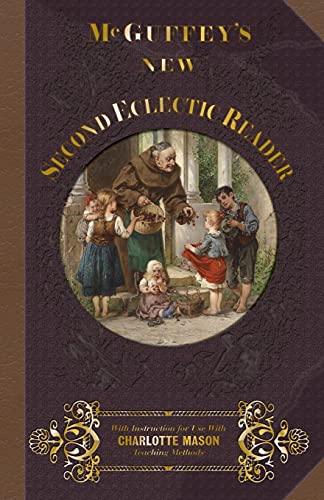McGuffey's Second Eclectic Reader: With Instructions for Use with Charlotte Mason Teaching Methods: Volume 2 (McGuffey's New Eclectic Readers) - Softcover

Inhaltsangabe
McGuffey’s Second Reader begins with a lesson on articulation, with instructions for the teacher, seven exercises, and a model for class drill. This is followed by 71 lessons, which include stories, essays, and poetry. Focus: Reading and Spelling Grade level: K-2 or as needed Content: 71 lessons, 180 pages McGuffey’s Second Eclectic Reader begins with a lesson on articulation, with instructions for the teacher, seven exercises, and a model for class drill. This is followed by 71 language arts lessons, based upon character-building stories, essays, and poetry. Each paragraph or stanza is numbered, which makes it very easy to assign portions of a passage or poem as copywork, recitation, or narration. In this reader, students will find spelling words listed at the beginning of each lesson. Many stories and nonfiction pieces are followed by a few questions. You may choose whether or not to use these or to simply substitute narration or a simple conversation about the story or poem. The second reader, like the others in the series, can be adapted of to fit classroom or homeschool needs. An introduction has been added with instructions for using Charlotte Mason's methods of copywork, recitation, and narration with the readers. Instructions for each of these methods is found in the new 18-page introduction that has been added to this edition. Like Miss Mason, Mr. McGuffey believed in short lessons, learned well, so the readers provide a convenient source for material to use with Miss Mason’s methods.
Die Inhaltsangabe kann sich auf eine andere Ausgabe dieses Titels beziehen.
Über die Autorin bzw. den Autor
William Holmes McGuffey (1800-1873) McGuffey was an American theologian and Professor of Moral Philosophy, Greek, and Latin who believed that education should include spiritual and moral training. He was mindful of the practical and budgetary issues of teaching in the one-room schoolhouses of the American frontier, and his goal was to create a curriculum that even untrained teachers could use to provide practical instruction in communication skills through memorable stories and poems. His Readers were often the only books that children had access to, and according to an article in the History and Culture newsletter of the National Park Service, "Most prominent post-Civil War and turn-of-the-century American figures credited their initial success in learning to the Readers.”
„Über diesen Titel“ kann sich auf eine andere Ausgabe dieses Titels beziehen.
Suchergebnisse für McGuffey's Second Eclectic Reader: With Instructions...
McGuffey's Second Eclectic Reader: With Instructions for Use with Charlotte Mason Teaching Methods (McGuffey's New Eclectic Readers)
Anbieter: Half Price Books Inc., Dallas, TX, USA
paperback. Zustand: Very Good. Connecting readers with great books since 1972! Used books may not include companion materials, and may have some shelf wear or limited writing. We ship orders daily and Customer Service is our top priority! Bestandsnummer des Verkäufers S_447216691
McGuffey's Second Eclectic Reader: With Instructions for Use with Charlotte Mason Teaching Methods (McGuffey Readers (1857 edition))
Anbieter: World of Books (was SecondSale), Montgomery, IL, USA
Zustand: Good. Item in good condition. Textbooks may not include supplemental items i.e. CDs, access codes etc. Bestandsnummer des Verkäufers 00091497965
McGuffey's Second Eclectic Reader: With Instructions for Use with Charlotte Mason Teaching Methods (McGuffey Readers (1857 edition))
Anbieter: Isle of Books, Bozeman, MT, USA
Paper Back. Zustand: Very Good. Bestandsnummer des Verkäufers 476507
McGuffey's Second Eclectic Reader: With Instructions for Use with Charlotte Mason Teaching Methods (McGuffey Readers (1857 edition))
Anbieter: Lexington Books Inc, Idaho Falls, ID, USA
Paperback. Zustand: Very Good. Bestandsnummer des Verkäufers 142862
McGuffey's New Second Eclectic Reader
Anbieter: GreatBookPrices, Columbia, MD, USA
Zustand: As New. Unread book in perfect condition. Bestandsnummer des Verkäufers 25040068
Gebraucht kaufen
Anzahl: Mehr als 20 verfügbar
McGuffey's Second Eclectic Reader: With Instructions for Use with Charlotte Mason Teaching Methods (McGuffey's New Eclectic Readers)
Anbieter: Lucky's Textbooks, Dallas, TX, USA
Zustand: New. Bestandsnummer des Verkäufers ABLIING23Mar2811580137642
Neu kaufen
Anzahl: Mehr als 20 verfügbar
McGuffey's New Second Eclectic Reader
Anbieter: GreatBookPrices, Columbia, MD, USA
Zustand: New. Bestandsnummer des Verkäufers 25040068-n
Neu kaufen
Anzahl: Mehr als 20 verfügbar
McGuffey's New Second Eclectic Reader
Print-on-DemandAnbieter: PBShop.store US, Wood Dale, IL, USA
PAP. Zustand: New. New Book. Shipped from UK. THIS BOOK IS PRINTED ON DEMAND. Established seller since 2000. Bestandsnummer des Verkäufers L0-9781613220160
Neu kaufen
Anzahl: Mehr als 20 verfügbar
McGuffey's New Second Eclectic Reader
Print-on-DemandAnbieter: PBShop.store UK, Fairford, GLOS, Vereinigtes Königreich
PAP. Zustand: New. New Book. Delivered from our UK warehouse in 4 to 14 business days. THIS BOOK IS PRINTED ON DEMAND. Established seller since 2000. Bestandsnummer des Verkäufers L0-9781613220160
Neu kaufen
Anzahl: Mehr als 20 verfügbar
McGuffey's New Second Eclectic Reader
Anbieter: Books Puddle, New York, NY, USA
Zustand: New. pp. 192. Bestandsnummer des Verkäufers 26391615517
